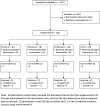A randomized trial of computer-delivered brief intervention and low-intensity contingency management for smoking during pregnancy
- PMID: 22157229
- PMCID: PMC3281243
- DOI: 10.1093/ntr/ntr221
A randomized trial of computer-delivered brief intervention and low-intensity contingency management for smoking during pregnancy
Abstract
Introduction: Implementation of evidence-based interventions for smoking during pregnancy is challenging. We developed 2 highly replicable interventions for smoking during pregnancy: (a) a computer-delivered 5As-based brief intervention (CD-5As) and (b) a computer-assisted, simplified, and low-intensity contingency management (CM-Lite).
Methods: A sample of 110 primarily Black pregnant women reporting smoking in the past week were recruited from prenatal care clinics and randomly assigned to CD-5As (n = 26), CM-Lite (n = 28), CD-5As plus CM-Lite (n = 30), or treatment as usual (n = 26). Self-report of smoking, urine cotinine, and breath CO were measured 10 weeks following randomization.
Results: Participants rated both interventions highly (e.g., 87.5% of CD-5As participants reported increases in likelihood of quitting), but most CM-Lite participants did not initiate reinforcement sessions and did not show increased abstinence. CD-5As led to increased abstinence as measured by cotinine (43.5% cotinine negative vs. 17.4%; odds ratio [OR] = 10.1, p = .02) but not for CO-confirmed 7-day point prevalence (30.4% abstinent vs. 8.7%; OR = 5.7, p = .06). Collapsing across CM-Lite status, participants receiving the CD-5As intervention were more likely to talk to a doctor or nurse about their smoking (60.5% vs. 30.8%; OR = 3.0, p = .02).
Conclusions: Low-intensity participant-initiated CM did not affect smoking in this sample, but the CD-5As intervention was successful in increasing abstinence during pregnancy. Further research should seek to replicate these results in larger and more diverse samples. Should CD-5As continue to prove efficacious, it could greatly increase the proportion of pregnant smokers who receive an evidence-based brief intervention.
Trial registration: ClinicalTrials.gov NCT01028131.
References
-
- Alessi SM, Badger GJ, Higgins ST. An experimental examination of the initial weeks of abstinence in cigarette smokers. Experimental & Clinical Psychopharmacology. 2004;12:276–287. doi:10.1037/1064-1297.12.4.276. - PubMed
-
- Andres RL, Day MC. Perinatal complications associated with maternal tobacco use. Seminars in Neonatology. 2000;5:231–241. doi:10.1053/siny.2000.0025. - PubMed
-
- Andrzejewski ME, Kirby KC, Morral AR, Iguchi MY. Technology transfer through performance management: The effects of graphical feedback and positive reinforcement on drug treatment counselors’ behavior. Drug and Alcohol Dependence. 2001;63:179–186. doi:10.1016/S0376-8716(00)00207-6. - PubMed
-
- Baer JS, Rosengren DB, Dunn CW, Wells EA, Ogle RL, Hartzler B. An evaluation of workshop training in motivational interviewing for addiction and mental health clinicians. Drug and Alcohol Dependence. 2004;73:99–106. doi:10.1016/j.drugalcdep.2003.10.001. - PubMed
-
- Chapin J, Root W. Improving obstetrician-gynecologist implementation of smoking cessation guidelines for pregnant women: An interim report of the American College of Obstetricians and Gynecologists. Nicotine & Tobacco Research. 2004;6(Suppl. 2):S253–S257. doi:10.1080/14622200410001669123. - PubMed
Publication types
MeSH terms
Associated data
Grants and funding
LinkOut - more resources
Full Text Sources
Medical
Miscellaneous


